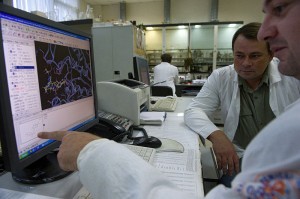
Will the R&D Tax Credit Spur Innovation?
Technological innovation is essential to a nation’s competitiveness in the global economy. Research and development (R&D) projects led by private companies often trigger this innovation. R&D has inspired private sector breakthroughs that have revolutionized the American economy in industries such as computers, medicine, and energy.
To be among the most competitive nations in the 21st century, the United States must encourage research and development projects through changes in tax policy and effective regulations.
 A recent report by the American Energy Innovation Council (AEIC), leaders of research programs at U.S. energy companies listed our nation’s tax credit policy among the greatest hindrances to greater R&D success. They additionally cited support from foreign governments as a major motivation to perform research abroad rather than in the United States.
A recent report by the American Energy Innovation Council (AEIC), leaders of research programs at U.S. energy companies listed our nation’s tax credit policy among the greatest hindrances to greater R&D success. They additionally cited support from foreign governments as a major motivation to perform research abroad rather than in the United States.
The two most frequent complaints about the R&D tax credit are its inconsistency and its low value. J. Michael McQuade of UTC told the AEIC that “we need a predictable tax credit.” Since its enactment in 1981, the R&D tax credit has expired eight times and has been renewed fourteen times. It was recently extended again (and retroactively applied to 2012), but is set to expire at the end of the year. The uncertainty surrounding the tax credit makes it incredibly difficult for private companies to set budgets, engage in new projects, and plan for future R&D. A permanent extension of the tax credit, proponents argue, may significantly increase its effectiveness and encourage further private sector research.
Researchers also argue that the R&D tax credit is valued too low to compete with similar policies abroad. In 2012, a study by the Information Technology & Innovation Foundation (ITIF) ranked the United States 27th globally in R&D tax incentive generosity. Developing nations such as India (ranked first), China, and Brazil are all ranked higher than the United States. Additionally, OECD nations such as Spain, Portugal, and France have more generous R&D tax incentives. ITIF notes that American tax credits cover from 14% to 20% of research expenditures, compared with a 200% super deduction for R&D in India.
 Yet not everyone believes that more effective tax credit is the key to R&D success. One analyst, Michael Rashkin, argues that private companies must engage in R&D to remain globally competitive, and will do so regardless of whether or not they are provided a tax credit. Additionally he notes that over 80% of the credits are earned by large companies such as Apple, Google, and Microsoft who probably do not need the credit to perform research.
Yet not everyone believes that more effective tax credit is the key to R&D success. One analyst, Michael Rashkin, argues that private companies must engage in R&D to remain globally competitive, and will do so regardless of whether or not they are provided a tax credit. Additionally he notes that over 80% of the credits are earned by large companies such as Apple, Google, and Microsoft who probably do not need the credit to perform research.
Tom Kavassalis of Xerox also argued against a more consistent tax credit. He told the AEIC that the tax credits quickly “become part of the baseline,” and do not promote further investment in research and development.
The claims made by Rashkin and Kavassalis may have some validity. A 2012 report by the National Science Foundation revealed the United States ranks ninth in 2009 R&D intensity, the R&D/GDP ratio, with an intensity of 2.88%. Half of the countries ranked ahead of the United States (including the top three- Israel, Finland and Sweden) all have less generous tax incentives according to the ITIF. Additionally, nations with the most generous tax credits (India, Portugal, Spain, and France) all have less R&D intensive economies. There is clearly not an obvious correlation between tax incentives and R&D intensity.
Tax incentives may encourage R&D and innovation, but it is not the only method for doing so. Moreover, it must not be our only tool for promoting research. An effective policy will address R&D through a variety of strategic measures. Such a policy would include not only incentives, but also research grants and proper regulations. The R&D tax incentive may be part of the answer to spurring innovation, but it is certainly not the whole solution.






[…] Will the R&D Tax Credit Spur Innovation? […]